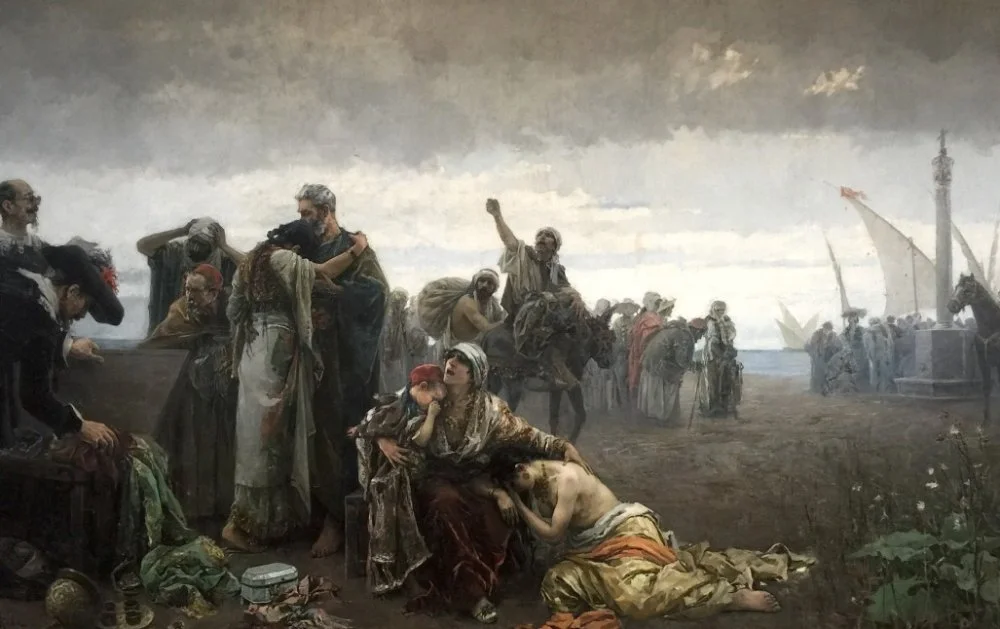In her lecture series, medieval historian Irina Varyash discusses how Muslims ruled Spain for approximately 800 years, transforming it into one of medieval Europe's most developed and prosperous regions. In the epilogue, Irina Varyash attempts to understand why the harmonious coexistence of two cultures ultimately proved impossible.
In 1492, the Catholic monarchs captured Granada, the last Islamic political center on the peninsula, and began implementing a policy of nonviolent conversion of Muslims to Christianity. However, this did not last long. In 1502, the Pragmatici
Over the course of twenty years, another social metamorphosis took place: the Moors started leaving, some to Fez, some to Cairo, and some to Istanbul. The Ottoman Empire generously opened its doors to Spanish Muslims. The fate of those who remained in Spain is a unique chapter in the history of the country. In 1609, Philip II of Habsburg issued a decree ordering the expulsion of the Moriscos as well, and the descendants of the Moors had to leave Spain within seven years. Aragon and Valencia were the regions most affected by this decree, losing up to 20–30 per cent of their populations. This decision, purely political in nature, became one of the reasons for the decline of the great empire from the mid-seventeenth century. Spain soon plunged into an economic, political, and ideological crisis.
We are accustomed to thinking that everything begins with political decline, which is then accompanied by an economic crisis, leading to cultural stagnation, a decrease in living standards, and a diminishing of quality of life. However, the history of Islam in Europe teaches us the exact opposite and demonstrates quite vividly how the concentration of culture on a narrow segment of its experience, the process of closing culture within itself, and its aspiration to achieve a uniform conformity in accordance with established truths once and for all leads to a civilizational crisis and, as a result, to political collapse.
In the sixteenth and early seventeenth centuries, the kingdom of Spain was a mighty hegemon, a great colonial power that stretched across Europe and the American continent, within which, as Emperor Charles V of Habsburg aptly put it, ‘the sun never sets’. At the same time, Spain possessed a social and cultural state that, surprisingly enough, implied the active preservation of the Christian monopoly in its Catholic variant, rather than developing an interest in something new, something different, or something else. The Spanish imposed their order and meanings on the indigenous people of America. They expelled the Moriscos, believing that they could not become true Catholics. In fact, it is from this historical point that Eurocentrism, created by political power, begins—the Eurocentrism that we all now try to overcome, both Europeans and the inhabitants of Dar al-Islam.
A similar story unfolded with the magnificent Islamic culture. In the thirteenth century, it lost its zeal for acquiring new knowledge, setting a sudden goal to affirm established truths. This shift led to the declaration of the closing of the 'gates of ijtihad'—the freedom to interpret and comment on theological and legal sources—resulting in the inevitable stagnation of knowledge. The shift in the social paradigm from a ‘republic of intellectuals’, where there were no permanently appointed authorities, but rather a plurality of opinions and a search for knowledge, coincided with the appearance of the Mongols, who were indifferent to the fragile nature of the culture, which always remains fragile, whether created by Arabs, or Persians, or Syrians, or others. From a historical perspective, the narrowing of the cultural horizon led to the decline of the Muslim world, and later to a submission to the standards imposed by Europe. And Europe forgot its apprenticeship in the Muslim world so comprehensively that even in the twenty-first century, we are in dire need of reminding.
Ultimately, it is about remembering 800 years of our own history, eight centuries of human experience, creativity, and intellectual movement. Is that a lot or a little? If every civilization eventually comes to an end, to its decline, then what’s the worth of its achievements, standards, and efforts? I believe that it is precisely the preservation of experience that gives meaning to the work of our ancestors accomplished 500 years ago. And it promises immortality—not for each of us individually, but for the good and great that we collectively contribute to.

Gabriel Roda. L'expulsio dels Moriscos. 19th century / Wikimedia Commons
What to read
1. Levi-Provencal, E. Arab Culture in Spain. Moscow, 1967.
2. Krachkovsky, I.Y. Arab Culture in Spain. Moscow-Leningrad, 1937.
3. Watt, W. M., Cachia, P. Muslim Spain. Moscow, 1976.
4. Montgomery Watt, W. The Influence of Islam on Medieval Europe. Various editions.
5. Varyash, I.I. Muslim Europe. Signals of Identity. St. Petersburg, 2020.
6. History of Spain. Volume 1. Moscow, 2012.
7. Hines Perez de Ita. The Tale of Segri and Abenserrahah. Moscow, 1981.
8. De Libera, A. Medieval Thought. Moscow, 2004.
9. Washington, I. Legends of Alhambra. Moscow, 1979. Various editions.
10. Menocal, M.R. The Ornament of the World: How Muslims, Jews, and Christians created a Culture of Tolerance in Medieval Spain. Boston, 2002.
11. Ibn Hazm. The Ring of the Dove. Moscow, 1957.
12. Song of the Cid. Romancero. Moscow, 1976.
